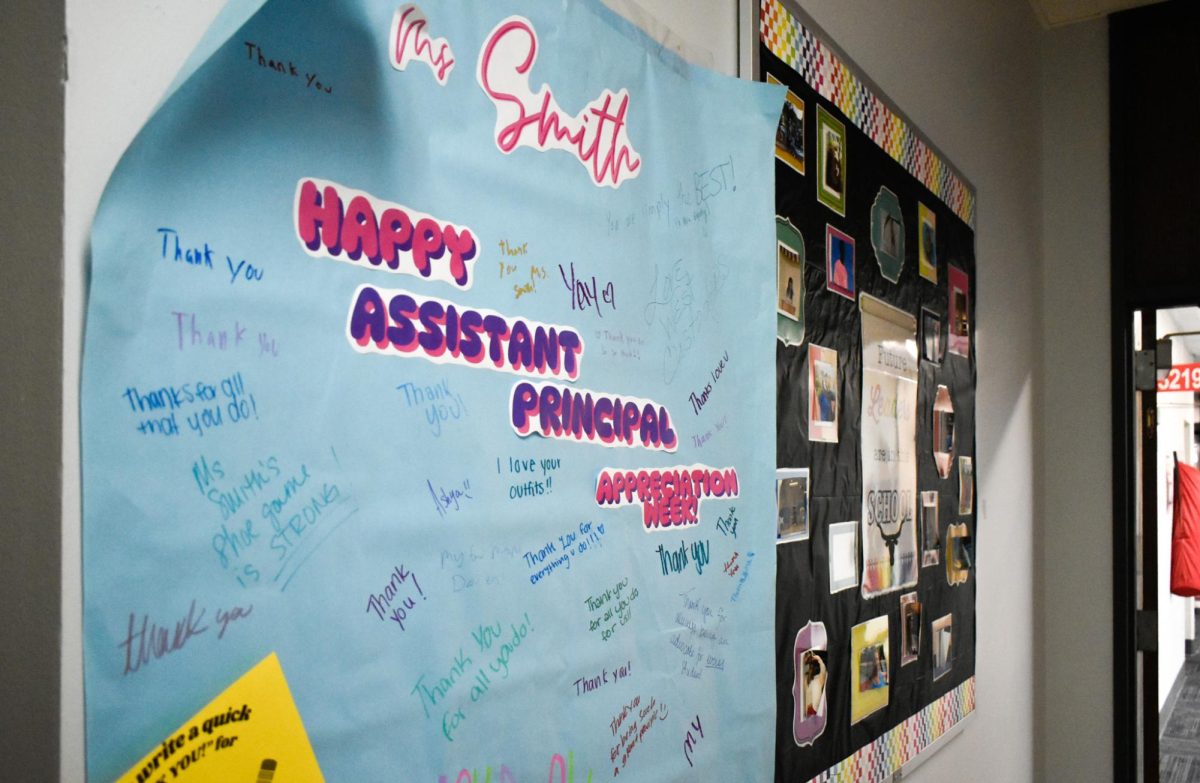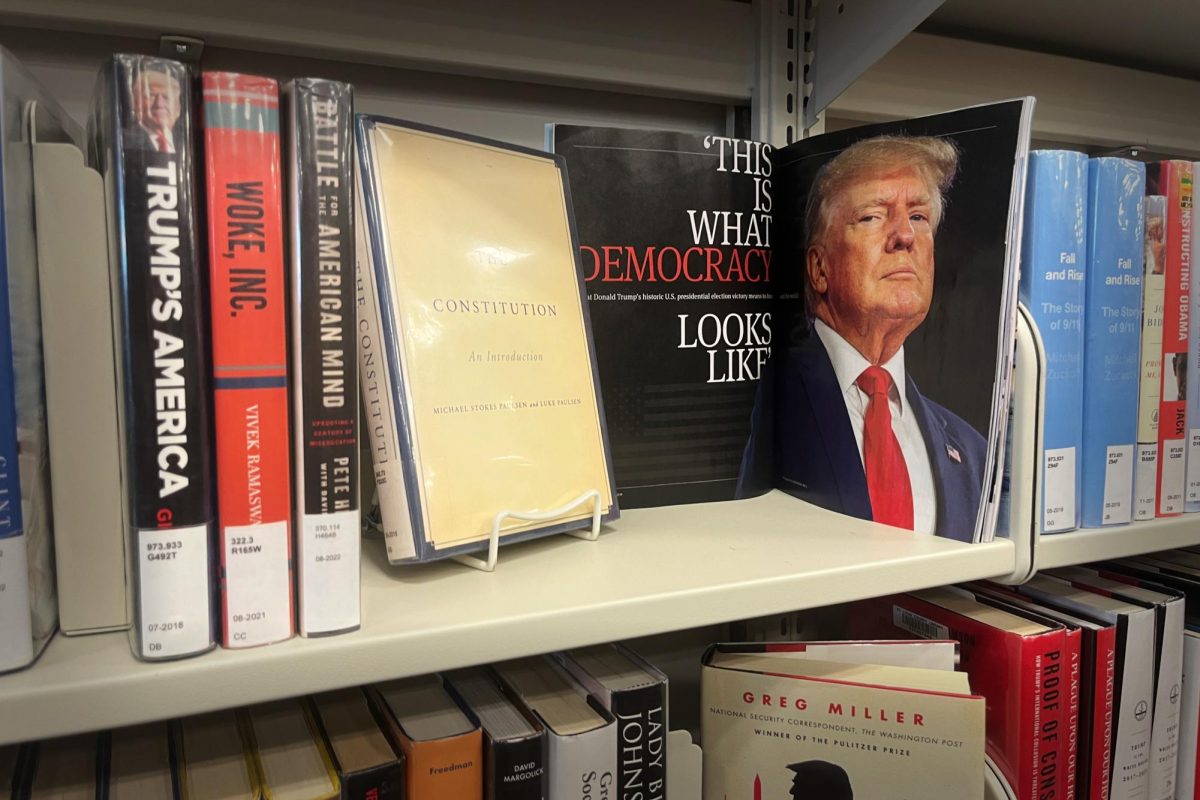Every May, the crinkling of wrapping paper and the clinking of coffee mugs fill the air, signaling the start of Teacher Appreciation Week. Across the school, students excitedly place handmade cards and small gifts on the desks of their favorite teachers to recognize their efforts. It’s a week full of gratitude, a moment to honor the dedication that teachers pour into their classrooms.
But as we hand out thank you notes and sweet treats, we simultaneously continue to restrict our teachers’ freedoms and silence their struggles. Too often, the way we talk about our teachers doesn’t match the way we treat them. Our “appreciation” ends where it’s easy — with gifts and kind comments — but when it comes to issues that truly matter, like teacher pay or work hours, we continue to turn a blind eye.
Appreciation is important, but when we fail to follow through with real change, we become hypocrites, appreciating our teachers only in rhetoric and not in reality. If we truly appreciate our teachers, we should be expanding the liberties that we grant them. We should be fighting for them, not just when it’s convenient to us, but in every moment, no matter the reason.
Unfortunately, teacher burnout is becoming more common, with 78% of teachers having considered quitting their profession since the 2020 pandemic. Time and time again, teachers across the nation struggle under countless issues, including a lack of administrative support, heavy workloads, staff shortages, student behavior and inadequate pay. These varying factors all contribute to a work environment that is twice as stressful compared to other professions.
Chemistry teacher Chloe Gallaher has been teaching for 28 years and is retiring this year. In her years of teaching, Gallaher has faced many professional challenges, often finding it difficult for her concerns to be truly acknowledged.
“Our administrative team will listen to us and understand [us], but they’re fighting an uphill battle. We can try to take it to central office, but central office has pretty much [said], ‘Well, thank you for your input,’ and then it gets put in the trash. They look at it as if they should be able to tell us what they want us to do with our time, and we should jump and follow it. For central office, work comes first before personal life or family,” Gallaher said.
Part of the issue of teacher burnout stems from a lack of understanding for the time that teachers actually spend dedicated to their work. When the school day ends and we go home or to our after-school activities, our teachers remain behind, responding to emails, grading papers and planning lessons. Our teachers work tirelessly for us, putting in an average of 53 hours a week. With our school day being seven hours, that means teachers spend an average of 3.6 additional hours a day, all of which is typically uncompensated.
One of the factors at the forefront of teacher frustrations is teacher pay. The media and schools often highlight the inequality problems involving race and gender, both fundamental concerns in today’s society. However, the disparities that our own teachers face, often just as severe, are overlooked. Take, for example, the pay gap, which is widely used to measure inequality; women earn an average of 83.6 cents for every dollar a man makes, and African American workers earn 84 cents for every dollar White workers make. Meanwhile, teachers earn 73.6 cents for every dollar other professionals make, representing wage disparities 10% worse than race or gender.
Teacher work hours are an especially sensitive topic within the school district, with teachers still reeling from Parkway’s controversial decision last year to reduce teacher plan time by 190 minutes a week. Gallaher believes that the reduction in plan time signalled Parkway administration’s lack of trust in our teachers.
“With plan time, we were looked at as just wasting time, and [administration] needed to find something else for us to do. [They say], ‘Oh yeah, we care about our teachers, but we don’t think you’re doing your job.’ It’s like speaking out both sides of your mouth, and you say one thing, but you act another way,” Gallaher said.
Other problems beyond the scope of their job continue to burden our teachers. Building maintenance has been a recurring issue across the district. In a single incident in November, a few days of rain resulted in 40 different reports of leaks across the campus. In addition to the leaks, teachers constantly deal with issues like broken faucets, asbestos exposure and mold growth, making it harder for teachers to properly educate students.
“We need an investment in our schools,” English teacher Marcy Rademeyer said. “I’ve worked with the board members and the administration and talked about the budget. It does seem overwhelming, because we have so many buildings [in Parkway]. But, I also know that it makes it hard for students and teachers to function and to want to be [at school] when things are leaking or not clean.”
As teachers continue to deal with these ongoing issues, the impacts and implications on the future of education cannot be ignored. If we continue to overlook the needs of our teachers — silencing their voices, reducing their resources and pushing them to their limits — what does that say to the next generation of educators we are growing?
West High encourages students to become teachers with numerous opportunities including the Spark Teaching and Learning strand as well as peer teaching programs like Link Crew, Parkway Path and Family and Consumer Science classes. But while we prepare future educators with training and experience, we fail to create an environment where they will be able to succeed in the future.
“Teachers do a lot and don’t get enough recognition for it. It definitely does discourage me, because I know being a teacher doesn’t get a lot of pay, but I know that I want to do something that I love,” senior Sidney Tyler said.
Tyler and other West High students who dream of becoming teachers are a reminder of what’s at stake — not just for current educators, but also for the future of education. If we want students and teachers alike to continue pursuing their passions without sacrificing their well-being and financial stability, we need to do more than thank teachers. We must act.
True appreciation means action. It means standing up for better pay, better conditions and an administration that’s willing to listen to the teachers holding up the entire education system. As students, instead of complaining about assignments or pressuring teachers to grade tests faster, we can respect our teachers in and out of the classroom by understanding and appreciating the time and energy they put in for us.
Too often, we make education about the students, and we forget that our learning is only possible because of our teachers. When we change education to be for our teachers, we foster a positive community that allows teachers to want to continue teaching.
“I wouldn’t change working in Parkway. I’ve worked in other districts, and I’m very fortunate for what we do get here. [But] there [are] so many avenues [where] issues can come from. Those issues don’t necessarily always start in the classroom with something that a teacher needs to do. There needs to be an honest look at all of the issues that are causing the problems, and how we [can] alleviate [them] best from there,” Gallaher said.


![Leaning on the podium, superintendent Melissa Schneider speaks to Parkway journalism students during a press conference. Schneider joined Parkway in July after working in the Thompson School District in Colorado. “My plan [to bond with students] is to get things on my calendar as much as possible. For example, being in [classes] is very special to me. I am trying to be opportunistic [meeting] kids [and] being in [the school] buildings. I have all the sports schedules and the fine arts schedules on my calendar, so that when I'm available, I can get to them,” Schneider said.](https://pwestpathfinder.com/wp-content/uploads/2025/09/IMG_5425-1200x943.jpeg)

![Red, white and blue, the American flag holds the values of our democracy. The fight that we once endured has returned, as student journalists and senior correspondents across the country are losing their voices due to government control. “[Are] the White House and [the] government limiting free speech [and] freedom of the press? Yes [they are],” chief communications officer of the Parkway School District and former journalist Elisa Tomich said.](https://pwestpathfinder.com/wp-content/uploads/2025/03/Untitled-design-14.jpg)
![A board in the Parkway West counseling department displays pennants of selective universities. With a wide range of students interested in attending, it’s important that these schools have clear priorities when deciding who to admit. “[Washington University] had the major that I wanted, psychology, philosophy, neuroscience. That's a holistic study of the brain, and [WashU is] the only college in the world that offers that. That's the main reason I wanted to go; I got into that program,” senior Dima Layth said.](https://pwestpathfinder.com/wp-content/uploads/2025/02/Flag-1.png)

![Within the U.S., the busiest shopping period of the year is Cyber Week, the time from Thanksgiving through Black Friday and Cyber Monday. This year, shoppers spent $13.3 billion on Cyber Monday, which is a 7.3% year-over-year increase from 2023. “When I was younger, I would always be out with my mom getting Christmas gifts or just shopping in general. Now, as she has gotten older, I've noticed [that almost] every day, I'll open the front door and there's three packages that my mom has ordered. Part of that is she just doesn't always have the time to go to a store for 30 minutes to an hour, but the other part is when she gets bored, she has easy access to [shopping],” junior Grace Garetson said.](https://pwestpathfinder.com/wp-content/uploads/2024/12/DSC_0249.JPG-1200x801.jpg)

![Senior Sally Peters stands in the history hallway, contemplating her choices in the 2024 United States and Missouri elections on Nov. 5. As a member of Diplomacy Club, Peters has discussed key candidates and issues in contemporary American politics. “[As students], we're starting to become adults. We're realizing how much the policies that are enforced and the laws that make it through the House and Senate are starting to affect us. [Opportunities such as] AP [U.S.Government] and Diplomacy Club [make elections feel] a lot more real,” Diplomacy Club vice president and senior Nidhisha Pejathaya said.](https://pwestpathfinder.com/wp-content/uploads/2024/10/Flag-1-1.png)
![Mounting school pressure can leave many students overworked and overstressed. Schools must give students the necessary resources to help assuage student mental health issues and prevent the development of serious crises. “The biggest thing [schools] can do [to protect student mental health] is offer more time [to do work], like a study hall, or offer more support from teachers so that students don't feel stressed out and can get help in areas that they need,” senior Bhavya Gupta said.](https://pwestpathfinder.com/wp-content/uploads/2024/09/unnamed-4.jpg)
![Like many students, sophomore Medina Nanic experiences pressure to do well in school. Through continuous success and achievements, West has developed a high academic standard for students. “Because we’re seen as one [of] the better schools, we have higher standards than the [schools] who aren’t ranked as high. There’s a lot of pressure on students to do [well] and live up to those standards,” Nanic said.](https://pwestpathfinder.com/wp-content/uploads/2024/05/DSC_0029-2-1200x800.jpg)
